Anti-cuts march: Anger amid the carnival
- Published
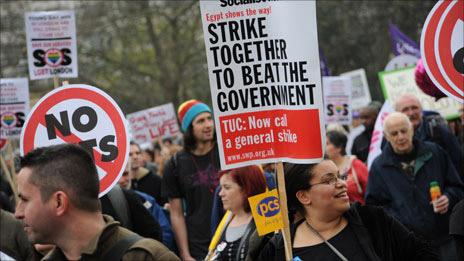
They were still tramping down Whitehall more than three hours after the march had begun.
Even hardened veterans of previous protests said they were impressed by the scale of the TUC's March for the Alternative.
Hundreds of thousands of people streamed through the centre of London and into Hyde Park to hear speeches from the likes of TUC leader Brendan Barber and Labour leader Ed Miliband.
There was a sense of pent-up frustration being released, as the protesters - teachers, nurses, doctors, council workers, trade unionists, students, the unemployed, retired people - chanted anti-cuts slogans and blew their whistles.
But it was, for the most part, a good-natured affair.
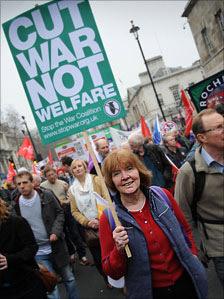
Protesters were also angry about the wars in Libya and Afghanistan
The young anarchists on the rampage in Oxford Street may end up grabbing most of the headlines.
But the majority of marchers were older people with families, who had travelled from different parts of the country to make their voices heard.
They were worried for their jobs and their livelihoods, they said, and wanted to send a message to the government.
"I don't suppose it will have much effect, but you can't just sit down and moan," said Ron Whittle, a Unison member, who had come down for the day from Blackburn, in Lancashire.
"Lots of people where I live are losing their jobs and I wanted to show my support," said 79-year-old Joy Sexton, a retired care worker.
University student Brice Bedos, whose eight-month old son Morten dozed in his pram apparently oblivious to the whistles and vuvuzelas blaring all around him, said: "We deliberately brought our children - because we wanted them to be part of the protest. It's about their future too."
But although there was a carnival atmosphere, with community choirs and fancy dress, there was also real anger.
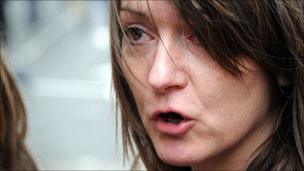
Sara Keeping was among those calling for a general strike
"We are because of the savage cuts that are ruining people's lives," said Michelle Lambert, whose home-made banner called for a general strike.
"Maybe they will call a general strike after this. it will give people more confidence."
Her friend, Sara Keeping, was on the march with her teenage daughter, who feared she would not be able to go to university due to tuition fees.
"We have to stop them. We have no choice but to try and stop them," she said.
And it was not just government spending cuts that people on the march were angry about.
"I am really disgusted that they are sending missiles up in Libya," said university research fellow Christine Nugent, a veteran of protest marches in the 1980s.
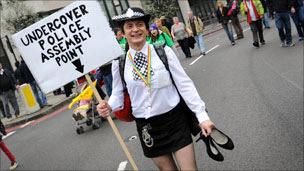
There was a carnival atmosphere for many
"They always seem to find the money for missiles and bombs."
Like many, she was keen to stress that it was not just "the usual suspects" on the march but people from many different backgrounds, some with political or union affiliations, others with none.
The majority of banners on display were from the big trade unions - Unite, Unison, the NUT, the PCS, the Fire Brigades Union, as well as groups such as CND, Stop the War and the Green Party.
Some said it felt like a return to the 1980s, when they demonstrated against public sector cuts imposed by Margaret Thatcher's government.
"They are making cuts on a scale Margaret Thatcher could only dream of, all on the back of a concept called the deficit," said Michael Stewart, whose home-made banner read "Like Thatcher, Only Worse".
"It has not taken that long to draw a lot of old wounds, especially from the NHS point of view," said Mr Stewart, an NHS physiotherapist from Kent, who grew up in the strife-torn Liverpool of the 1980s.
"I feel particularly angry because I voted Lib Dem, after voting Labour for many years," he added.
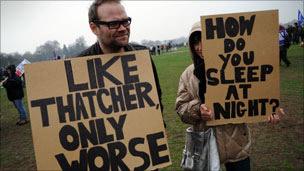
Michael Stewart was worried about the future of the NHS
But unlike the recent student protests, where Lib Dem leader Nick Clegg was the focus of the crowd's anger, this seemed to be largely an anti-Tory protest.
There was also a definite sense that this was a post Tahrir Square event - and not just in Trafalgar Square where members of the Education Activist Network were staging a 24-hour protest, in an attempt to replicate the "people power" sweeping the Middle East.
Many banners called on the government to "Leave Libya Alone" - but some marchers detected a change in tactics by the police as a result of events in the Middle East.
"If this had been the student protest, we would have been kettled by now," said sixth former Miles Frandsen, who was in Hyde Park to watch the speeches.
"I think, with the coalition attacking Libya, I think they are trying to show that when we have a protest here we are more relaxed about it. It would make us look hypocritical if there was a big crackdown."
- Published27 March 2011
- Published15 December 2010
- Published25 March 2011
- Published24 March 2011